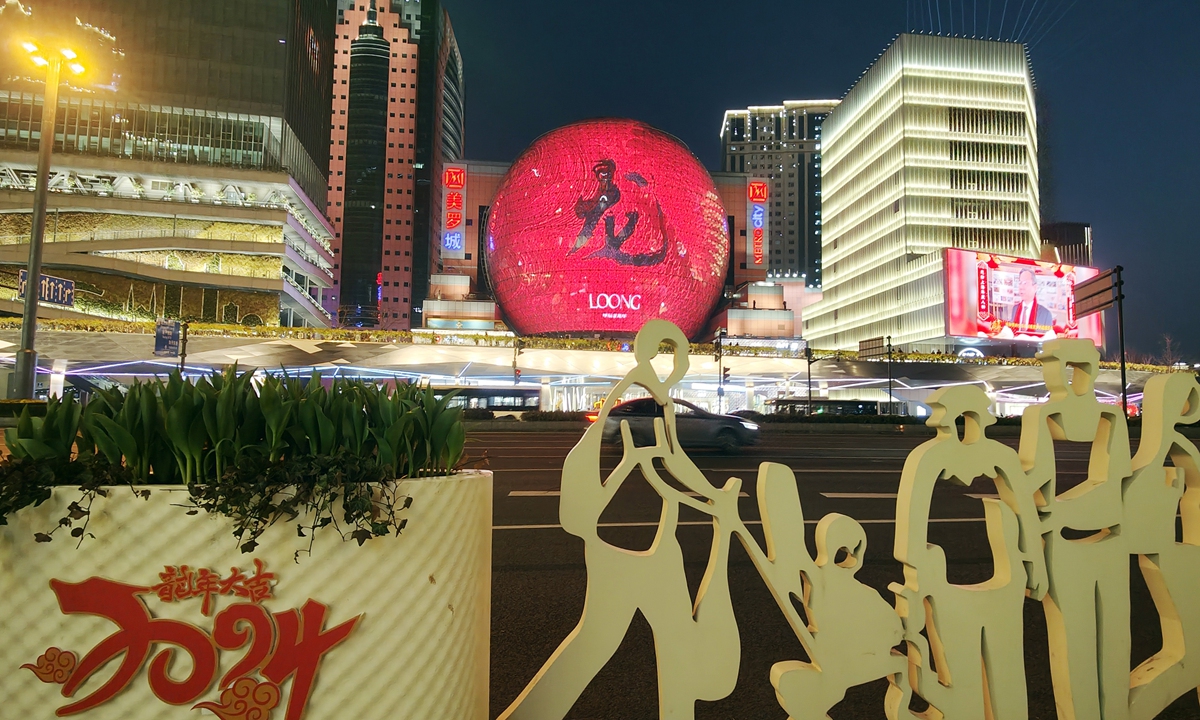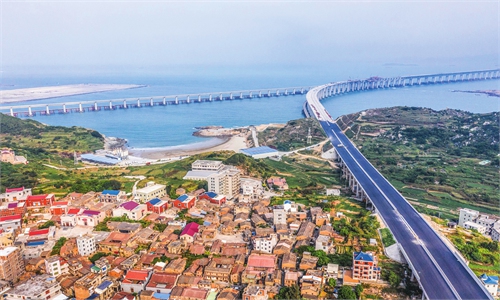IN-DEPTH / IN-DEPTH
Hometown witness: Shanghai attracts foreign visitors with improved opening-up policy, service during Chinese New Year
Reunited, open, and inclusive
Editor's Note:
The world recently celebrated a splendid Chinese New Year, welcoming the Year of the Dragon.
During the holidays, Global Times reporters returned to their hometowns where they were reacquainted with old traditions and introduced to new post-pandemic experiences. To share their experience, we have launched the "Hometown Diary" series. Spanning from north to south, east to west, six articles will focus on different provinces, exploring the development and evolution from traditional to modern, and from economic to cultural dimensions.
This series is not only a comprehensive review of China's vast territory and diverse regional cultures but also a profound reflection of how different areas across the country maintain their identity and embrace changes.
Through the lens of hometown observations, we hope to touch the hearts of our readers, allowing everyone to find resonance in these stories and feel the warmth and vitality that hometowns provide, regardless of changes brought about by time.
This is the third installment in the series, in which we gain a fresh perspective into understanding how Fuzhou has transformed to become a bridgehead for the integrated development of both sides of the Taiwan Straits, and how Shanghai serves as an attractive opening-up portal to the outside world.

To my surprise, I witnessed a very lively Shanghai. People of different colors flooded every landmark, park, and shopping mall, posing for photos, tasting Shanghai-style snacks, chatting with their friends and families in various languages, and enjoying the city's surprisingly warm festive season weather.
It's common to see foreigners in Shanghai, as one of the most open and international metropolises in China. I was, nonetheless, a little amazed at the increasing number of foreign faces I encountered on the streets over the Chinese New Year period. I realized that many of them were tourists, probably visiting Shanghai for the first time.
Obviously, since the Chinese government announced temporary visa-free entry policies to more countries and regions, this time-honored and rapidly developing eastern country is becoming a new first-choice destination for global tourists.
First stop for expats to explore China
For many international tourists, Shanghai is an obvious first stop on a journey to explore a charming and mysterious China, especially during the Chinese New Year. With a perfect combination of traditional culture and international development, this city enables newcomers to wonderfully experience China's traditional festival customs without many language or lifestyle barriers.
The Yuyuan Garden in downtown Shanghai, a 450-year-old classical garden with exquisite architecture and tranquil landscapes, is a must-visit for foreign visitors. During the Chinese New Year holidays each year, visitors have the added luck of enjoying its gorgeous temporary New Year-themed lantern show.
On social media, Elon Musk's mother, Maye Musk, recently shared photos and videos of her at the garden. "When in Shanghai, I saw the most magnificent displays for [the] Year of the Dragon," she wrote on X, wishing a Happy New Year to her Chinese friends. Later Elon Musk replied, "More people should visit China."
Armenian violinist Astrid Poghosyan told me that she had also been to Yuyuan Garden. Dressed in an elegant Shanghai-style qipao, she posed for photos in front of the windows of a traditional attic, with colorful lantern lights hanging out of the windows as a beautiful backdrop.
Poghosyan had spent many Chinese New Year holidays in Shanghai since settling in this city in 2009. In the Spring festival, she would go to theaters and shopping malls, and celebrate the festival with her Chinese friends.
She shared some places across the city that she would recommend to foreign visitors to explore, from popular tourist attractions such as the Xujiahui historic area, to Wukang Road, both of which show Shanghai's charms from different angles.
Moreover, to better experience the festive atmosphere, Poghosyan said she suggests that expats in Shanghai spend the Chinese New Year with Chinese families.
"I would always spend the Chinese New Year with my Chinese friends, and I was very impressed by eating sunflower seeds and watching chunwan (the Chinese New Year gala) on TV," she smiled. "These were some very typical [Chinese New Year experiences]."
A window to nation's high-level opening-up
To many foreign visitors, Shanghai is not only the first stop on their China trip, but also an important window to closely experience China's modern development and its high-level opening-up.
Data showed that Shanghai received a total of 16.7595 million tourists over the eight-day Chinese New Year holidays this year, an increase of 50 percent year-on-year.
In Shanghai, "high-level opening-up" is never just a slogan. It can be found in many details of the city. I still remember how excited I was one day in November, when I saw a small board at a downtown restaurant that read "Visa, Master now available." The restaurant owner told me that just days before, they had updated the payment system under the city government's guidance.
Many foreign visitors have noticed and celebrated this improvement in payment methods. On February 8, two days before this year's Chinese New Year holidays, I randomly talked to a few foreign tourists at the Shanghai Railway Station. One of them was a Japanese university student who planned to have a week-long stay in Shanghai.
"In the past, I used Alipay's English version. Now in Shanghai I can't wait to directly pay with my master card; that's much better and convenient for us international visitors," a a Japanese university student nicknamed Ai told me at the Shanghai Railway Station, who planned to have a week-long stay in Shanghai.
Improvement in payment methods is just a small part of Shanghai's efforts. In recent months, Shanghai has worked incredibly hard to let expats in the city, both tourists and residents, feel at home.
On January 1, the Shanghai government unveiled a new online expat service provision portal, introducing the beta version of its English website alongside accounts on social media including on Facebook and X. The portal, which will later be available in eight other languages, is designed to provide expats in Shanghai with authoritative information and interactive services in areas such as business and job-seeking, in addition to studying, traveling and shopping.
Prior to that, Shanghai released a handbook named International Services Shanghai: A Guide to Shanghai for Expats in September 2023, which contains the most useful information including on public transportation and medical care.
Some expats told me that the handbook has become their "second passport in Shanghai."
Having come to Shanghai as far back as 2009, Poghosyan joked that she is sort of "envious" of the newcomers, who can enjoy many more conveniences that Shanghai now offers international visitors compared to years before. "The service website, and the visa and master payment methods, are very good examples that show the big progress Shanghai has made in this aspect," she said.
The last time I saw Poghosyan in person was at the closing ceremony of a painting exhibition "Foreigners, But Not Outsiders" in November 2023. At the time, China had just implemented policies that extend visa-free entry to travelers from six countries - France, Germany, Italy, the Netherlands, Spain, and Malaysia - for a stay of 15 days.
Poghosyan applauded the visa-free entry policy. "This is a very good step forward," she said to me. "I very much welcome people, not only from the six countries included in the policy but also from all over the world, to come to China, and take a closer look at the real China."
Having been living in Shanghai for decades, I have fully felt the charms of this "second hometown" to domestic and foreign migrants, global tourists, as well as international enterprises. I believe that Shanghai, as a bridgehead for China's high-level opening-up, will continue attracting more people to come, experience, and even settle here with its openness, inclusiveness, and diversity.
Lu Ting also contributed to this story
The world recently celebrated a splendid Chinese New Year, welcoming the Year of the Dragon.
During the holidays, Global Times reporters returned to their hometowns where they were reacquainted with old traditions and introduced to new post-pandemic experiences. To share their experience, we have launched the "Hometown Diary" series. Spanning from north to south, east to west, six articles will focus on different provinces, exploring the development and evolution from traditional to modern, and from economic to cultural dimensions.
This series is not only a comprehensive review of China's vast territory and diverse regional cultures but also a profound reflection of how different areas across the country maintain their identity and embrace changes.
Through the lens of hometown observations, we hope to touch the hearts of our readers, allowing everyone to find resonance in these stories and feel the warmth and vitality that hometowns provide, regardless of changes brought about by time.
This is the third installment in the series, in which we gain a fresh perspective into understanding how Fuzhou has transformed to become a bridgehead for the integrated development of both sides of the Taiwan Straits, and how Shanghai serves as an attractive opening-up portal to the outside world.

A high-tech light show illuminates the night to celebrate Chinese New Year in Shanghai's city center Xujiahui area, on February 10, 2024. Photo: VCG
I had assumed that Shanghai would be relatively quiet during this Chinese New Year holidays, when many migrant workers would leave for their hometowns during this annual family reunion season.To my surprise, I witnessed a very lively Shanghai. People of different colors flooded every landmark, park, and shopping mall, posing for photos, tasting Shanghai-style snacks, chatting with their friends and families in various languages, and enjoying the city's surprisingly warm festive season weather.
It's common to see foreigners in Shanghai, as one of the most open and international metropolises in China. I was, nonetheless, a little amazed at the increasing number of foreign faces I encountered on the streets over the Chinese New Year period. I realized that many of them were tourists, probably visiting Shanghai for the first time.
Obviously, since the Chinese government announced temporary visa-free entry policies to more countries and regions, this time-honored and rapidly developing eastern country is becoming a new first-choice destination for global tourists.
First stop for expats to explore China
For many international tourists, Shanghai is an obvious first stop on a journey to explore a charming and mysterious China, especially during the Chinese New Year. With a perfect combination of traditional culture and international development, this city enables newcomers to wonderfully experience China's traditional festival customs without many language or lifestyle barriers.
The Yuyuan Garden in downtown Shanghai, a 450-year-old classical garden with exquisite architecture and tranquil landscapes, is a must-visit for foreign visitors. During the Chinese New Year holidays each year, visitors have the added luck of enjoying its gorgeous temporary New Year-themed lantern show.
On social media, Elon Musk's mother, Maye Musk, recently shared photos and videos of her at the garden. "When in Shanghai, I saw the most magnificent displays for [the] Year of the Dragon," she wrote on X, wishing a Happy New Year to her Chinese friends. Later Elon Musk replied, "More people should visit China."
Armenian violinist Astrid Poghosyan told me that she had also been to Yuyuan Garden. Dressed in an elegant Shanghai-style qipao, she posed for photos in front of the windows of a traditional attic, with colorful lantern lights hanging out of the windows as a beautiful backdrop.
Poghosyan had spent many Chinese New Year holidays in Shanghai since settling in this city in 2009. In the Spring festival, she would go to theaters and shopping malls, and celebrate the festival with her Chinese friends.
She shared some places across the city that she would recommend to foreign visitors to explore, from popular tourist attractions such as the Xujiahui historic area, to Wukang Road, both of which show Shanghai's charms from different angles.
Moreover, to better experience the festive atmosphere, Poghosyan said she suggests that expats in Shanghai spend the Chinese New Year with Chinese families.
"I would always spend the Chinese New Year with my Chinese friends, and I was very impressed by eating sunflower seeds and watching chunwan (the Chinese New Year gala) on TV," she smiled. "These were some very typical [Chinese New Year experiences]."
A window to nation's high-level opening-up
To many foreign visitors, Shanghai is not only the first stop on their China trip, but also an important window to closely experience China's modern development and its high-level opening-up.
Data showed that Shanghai received a total of 16.7595 million tourists over the eight-day Chinese New Year holidays this year, an increase of 50 percent year-on-year.
In Shanghai, "high-level opening-up" is never just a slogan. It can be found in many details of the city. I still remember how excited I was one day in November, when I saw a small board at a downtown restaurant that read "Visa, Master now available." The restaurant owner told me that just days before, they had updated the payment system under the city government's guidance.
Many foreign visitors have noticed and celebrated this improvement in payment methods. On February 8, two days before this year's Chinese New Year holidays, I randomly talked to a few foreign tourists at the Shanghai Railway Station. One of them was a Japanese university student who planned to have a week-long stay in Shanghai.
"In the past, I used Alipay's English version. Now in Shanghai I can't wait to directly pay with my master card; that's much better and convenient for us international visitors," a a Japanese university student nicknamed Ai told me at the Shanghai Railway Station, who planned to have a week-long stay in Shanghai.
Improvement in payment methods is just a small part of Shanghai's efforts. In recent months, Shanghai has worked incredibly hard to let expats in the city, both tourists and residents, feel at home.
On January 1, the Shanghai government unveiled a new online expat service provision portal, introducing the beta version of its English website alongside accounts on social media including on Facebook and X. The portal, which will later be available in eight other languages, is designed to provide expats in Shanghai with authoritative information and interactive services in areas such as business and job-seeking, in addition to studying, traveling and shopping.
Prior to that, Shanghai released a handbook named International Services Shanghai: A Guide to Shanghai for Expats in September 2023, which contains the most useful information including on public transportation and medical care.
Some expats told me that the handbook has become their "second passport in Shanghai."
Having come to Shanghai as far back as 2009, Poghosyan joked that she is sort of "envious" of the newcomers, who can enjoy many more conveniences that Shanghai now offers international visitors compared to years before. "The service website, and the visa and master payment methods, are very good examples that show the big progress Shanghai has made in this aspect," she said.
The last time I saw Poghosyan in person was at the closing ceremony of a painting exhibition "Foreigners, But Not Outsiders" in November 2023. At the time, China had just implemented policies that extend visa-free entry to travelers from six countries - France, Germany, Italy, the Netherlands, Spain, and Malaysia - for a stay of 15 days.
Poghosyan applauded the visa-free entry policy. "This is a very good step forward," she said to me. "I very much welcome people, not only from the six countries included in the policy but also from all over the world, to come to China, and take a closer look at the real China."
Having been living in Shanghai for decades, I have fully felt the charms of this "second hometown" to domestic and foreign migrants, global tourists, as well as international enterprises. I believe that Shanghai, as a bridgehead for China's high-level opening-up, will continue attracting more people to come, experience, and even settle here with its openness, inclusiveness, and diversity.
Lu Ting also contributed to this story




